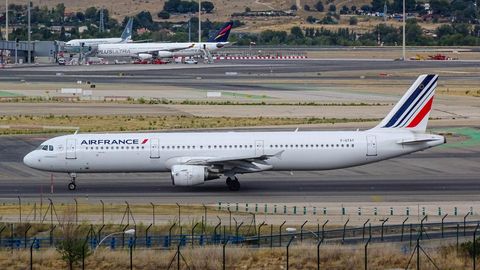Companies news • Analyses & Studies • Publications
Air France-KLM accelerates its environmental transition and commits - with the Science-Based Targets initiative (SBTi) - to setting targets in line with the Paris Agreement to limit global warming

- Air France-KLM commits to setting additional CO2 reduction targets for 2035, in addition to its ambition to reach net zero emissions by 2050
- The Group will submit these targets to SBTi for validation in the first half of 2022
- The Science-Based Targets approach aims to limit global warming to well below 2°C, in line with the Paris Agreement.
The Air France-KLM Group and its airlines are continuing their efforts to reduce their environmental footprint as part of a transparent and responsible approach to the challenges of global warming.
Today, the Group commits to having its CO2 emissions reduction targets validated by the independent reference organization SBTi, founded by the Carbon Disclosure Project (CDP), the United Nations Global Compact and the World Wildlife Fund (WWF). SBTi assesses and checks companies' CO2 emissions reduction targets based on a scientific approach and criteria, ensuring that the targets are in line with the Paris Agreement.
The letter of commitment signed today with SBTi places the Air France-KLM Group and its airlines in the trajectory determined by this Agreement, which aims to limit global warming to well below 2°C. Air France-KLM is one of the first European airline group to have its decarbonisation trajectory validated by SBTi.
This new important step in the Group's decarbonisation strategy comes in addition to its objective of net zero emissions by 2050.
“The climate emergency is undoubtedly the greatest challenge our industry faces today. All employees of the Group and its airlines have been working for many years to reduce their environmental footprint, but we now need to accelerate our transition towards a more sustainable air transport. The SBTi commitment illustrates our determination to achieve this, by placing our emissions reduction trajectory within a scientifically indisputable and demanding framework. We are signing this commitment because we are confident in our ability to make this transition collectively, together with our people, our customers and all our partners,” said Benjamin Smith, CEO of the Air France-KLM Group.
The Air France-KLM group's decarbonisation trajectory is mainly based on:
- An ambitious plan to renew the fleet of the Group’s airlines with new generation aircraft emitting 20 to 25% less CO2. Between 2019 and 2021, the Group invested 2.5 billion euros in fleet renewal.
- The use of Sustainable Aviation Fuels (SAF). These non-fossil fuels are produced from industrial or domestic waste in a circular economy, and do not compete with the human food chain. Air France and KLM have been pioneers in the use of these fuels, which will play a key role in the decarbonization of air transport, as they reduce greenhouse gas emissions by an average of 80% over the entire life cycle. Today, the Group is working to make these fuels more accessible in terms of quantity and price by creating an actual sustainable aviation fuel industry in Europe.
- The search for greater efficiency in its operations, by favouring more direct trajectories and applying procedures that limit fuel consumption (lighter aircraft, single-engine taxi, continuous descent). Air France and KLM have set themselves the target of carbon neutrality for ground operations by 2030.
In addition, Air France-KLM is mobilizing the entire sector and is committed to the development of innovative solutions for aircraft design and maintenance, engines, or synthetic fuels, which will gradually lead to totally carbon-free aviation.


